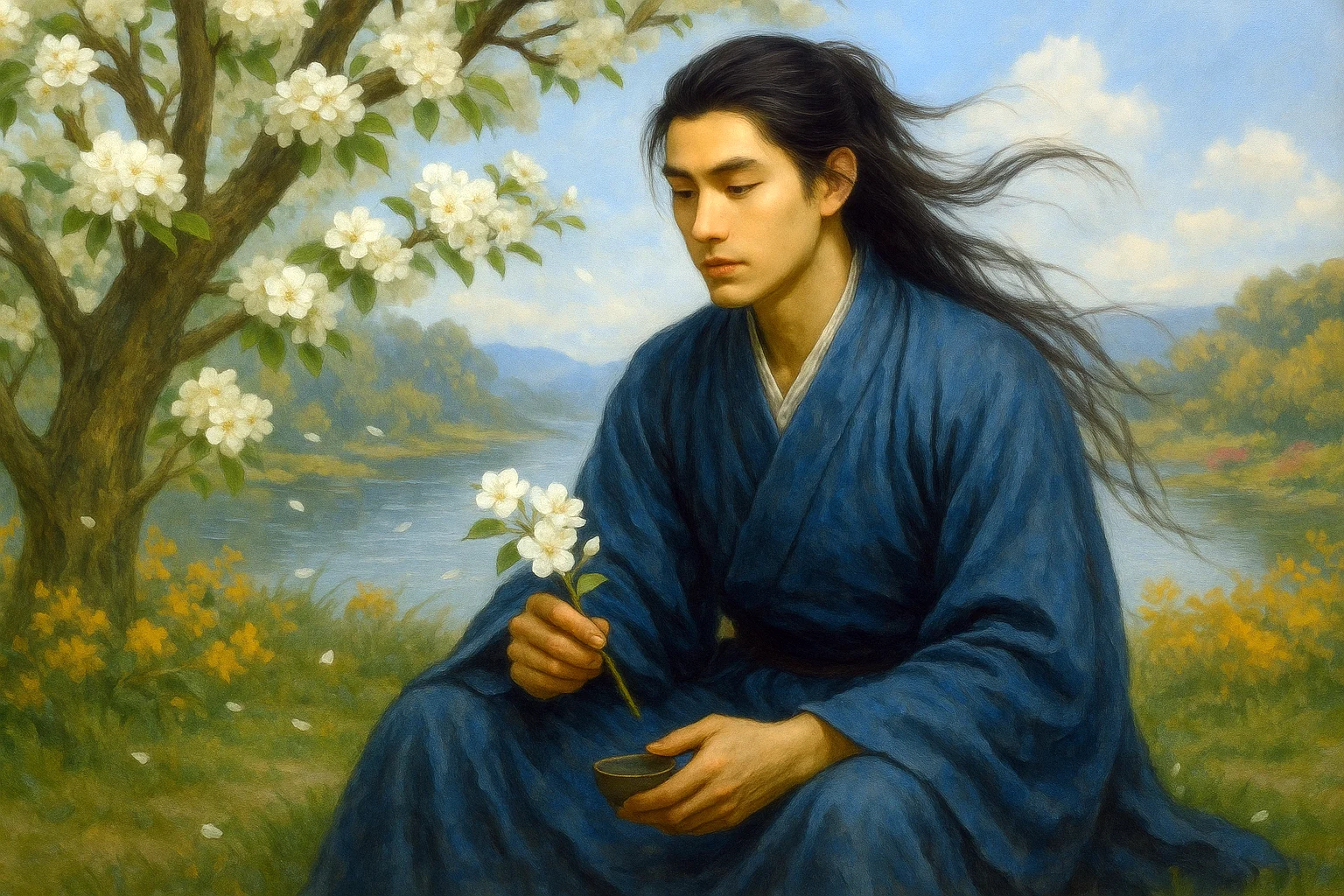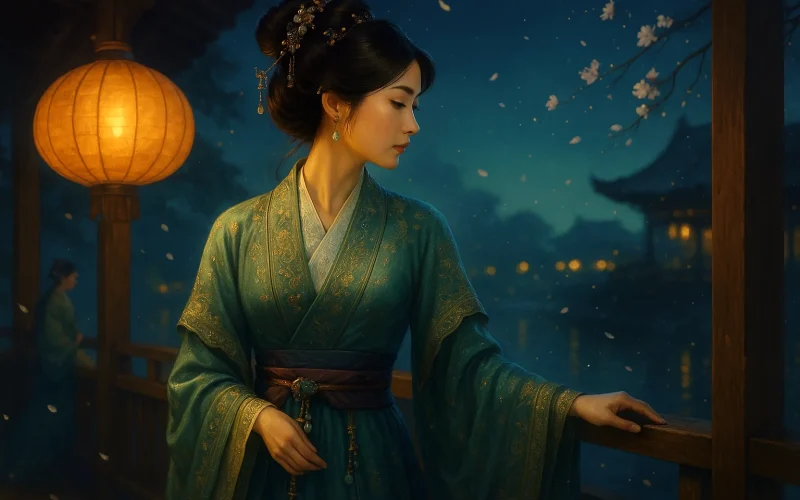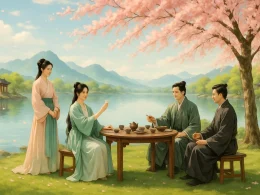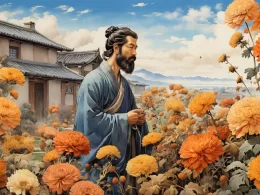By Yulei’s walls, we raced on horseback—
In Tongdi’s market, we shared the same boat.
Your love once chimed in the sway of my bangles,
Now I hide my tears behind my sleeve.
Once, I sang to make you drunk with joy—
Today, I blush to even think of dancing.
Still I keep the songs I wrote for you,
Climbing alone to the wine-house of Xiangyang.
Original Poem
「代弃妇答贾客」
李端
玉垒城边争走马,铜鞮市里共乘舟。
鸣环动珮恩无尽,掩袖低巾泪不流。
畴昔将歌邀客醉,如今欲舞对君羞。
忍怀贱妾平生曲,独上襄阳旧酒楼。
Interpretation
This Tang-era poem adopts the voice of a forsaken wife addressing her former lover—a popular trope in classical poetry that used women's plights to explore themes of betrayal and constancy. Li Duan, renowned for his delicate portrayals of heartache, crafts a poignant monologue where restrained elegance amplifies the depth of sorrow. Through the abandoned woman's vivid recollections and silent grief, the poem exposes the cruelty of fleeting affections against the endurance of true devotion.
First Couplet: "玉垒城边争走马,铜鞮市里共乘舟。"
Yù lěi chéng biān zhēng zǒu mǎ, tóng dī shì lǐ gòng chéng zhōu.
Remember how our steeds raced by Jade Fort's walls?
How shared boats cut through Tongdi's bustling tides?
The opening bursts with kinetic nostalgia—the pounding hooves (争走马) and gliding vessels (共乘舟) preserving their passion in perpetual motion. These flashbacks, vivid as painted scrolls, heighten the present's hollow silence.
Second Couplet: "鸣环动珮恩无尽,掩袖低巾泪不流。"
Míng huán dòng pèi ēn wújìn, yǎn xiù dī jīn lèi bù liú.
Your jade pendants chimed with endless vows—
Now my sleeves catch tears before they fall.
Here, sound and silence collide: the melodic tinkling of adornments (鸣环动珮), once symbols of ardor, gives way to mute restraint (掩袖低巾). The unshed tears (泪不流) speak louder than wailing—a masterclass in sorrow's quiet dignity.
Third Couplet: "畴昔将歌邀客醉,如今欲舞对君羞。"
Chóuxī jiāng gē yāo kè zuì, rújīn yù wǔ duì jūn xiū.
Once I sang to intoxicate your heart;
Now my dancing limbs freeze mid-step.
The contrast stings—her past self, a muse who poured wine and song (将歌邀客醉) without reserve, now stiffens with shame (欲舞对君羞). The body itself becomes a map of emotional ruin, where every gesture traces the erosion of confidence.
Fourth Couplet: "忍怀贱妾平生曲,独上襄阳旧酒楼。"
Rěn huái jiàn qiè píngshēng qǔ, dú shàng Xiāngyáng jiù jiǔlóu.
I choke back our anthem of bygone days,
Climbing Xiangyang's tavern stairs—alone.
The finale devastates through economy. The suppressed "anthem" (平生曲) symbolizes all their shared history, now too painful to voice. Her solitary ascent (独上) to their once-joyful haunt mirrors love's cruel arithmetic: two entered, one remains.
Holistic Appreciation
This is a plaintive love poem voiced in a feminine persona, yet it avoids shallow lamentation. Instead, it unfolds in layers—emotions shifting from intense to subdued, joy to sorrow, ultimately culminating in the solitary act of "ascending the tavern alone." The abandoned woman here is not merely resentful; she remembers past sweetness yet bears present cruelty. Her restrained, almost reticent outpouring, devoid of loud accusations, makes the sorrow all the more piercing.
Li Duan masterfully threads shifting scenes to mirror emotional transitions: from the kinetic imagery of shared horses and boats to the static grief of "sleeve-veiled tears"; from the fervor of song-and-dance hospitality to the alienation of "shame to face you"; finally settling into the bleakness of solitary ascent, swallowing unspoken words. Not once does the poem directly blame the lover, yet every line pulses with unvoiced hurt, every phrase cradles hidden tears—revealing both poetic virtuosity and profound psychological insight.
Artistic Merits
Li Duan adopts a dàiyán (prosopopoeic) technique, channeling a woman’s perspective with visceral authenticity. His genius lies in conveying psyche through minute gestures: "sleeve raised, scarf lowered," "too ashamed to dance before you," "ascending the tavern alone"—each detail opens a window into her inner world. The language, classical yet unadorned, flows with natural emotional cadence, echoing the raw lyricism of yuefu folk ballads. Li Duan controls the emotional tempo like a composer, immersing readers gradually into the woman’s psyche—simultaneously evoking empathy and sustaining poetic tension.
Insights
"A Forsaken Woman Answers the Merchant" transcends personal grievance; through one woman’s monologue, it mirrors societal fickleness and gendered emotional inequity. Its resonance endures today: in relationships, the deepest wounds stem not from separation, but indifference and erasure. With exquisite strokes, the poet captures feminine resilience, vulnerability, and solitude post-abandonment—a reminder that love demands respect and cherishing. The truest love poetry, this poem whispers, speaks not in shouts, but in trembling truths.
About the Poet

Li Duan (李端, c. 743–785), a native of Zhaoxian in Hebei Province, was among the "Ten Literary Talents of the Dali Era" during the Mid-Tang period. He excelled particularly in five-character regulated verse, crafting poetry of refined elegance and subtle nuance. His works frequently explored themes of reclusive living and the melancholy of separation, with over 250 poems preserved in the Complete Tang Poetry anthology.











